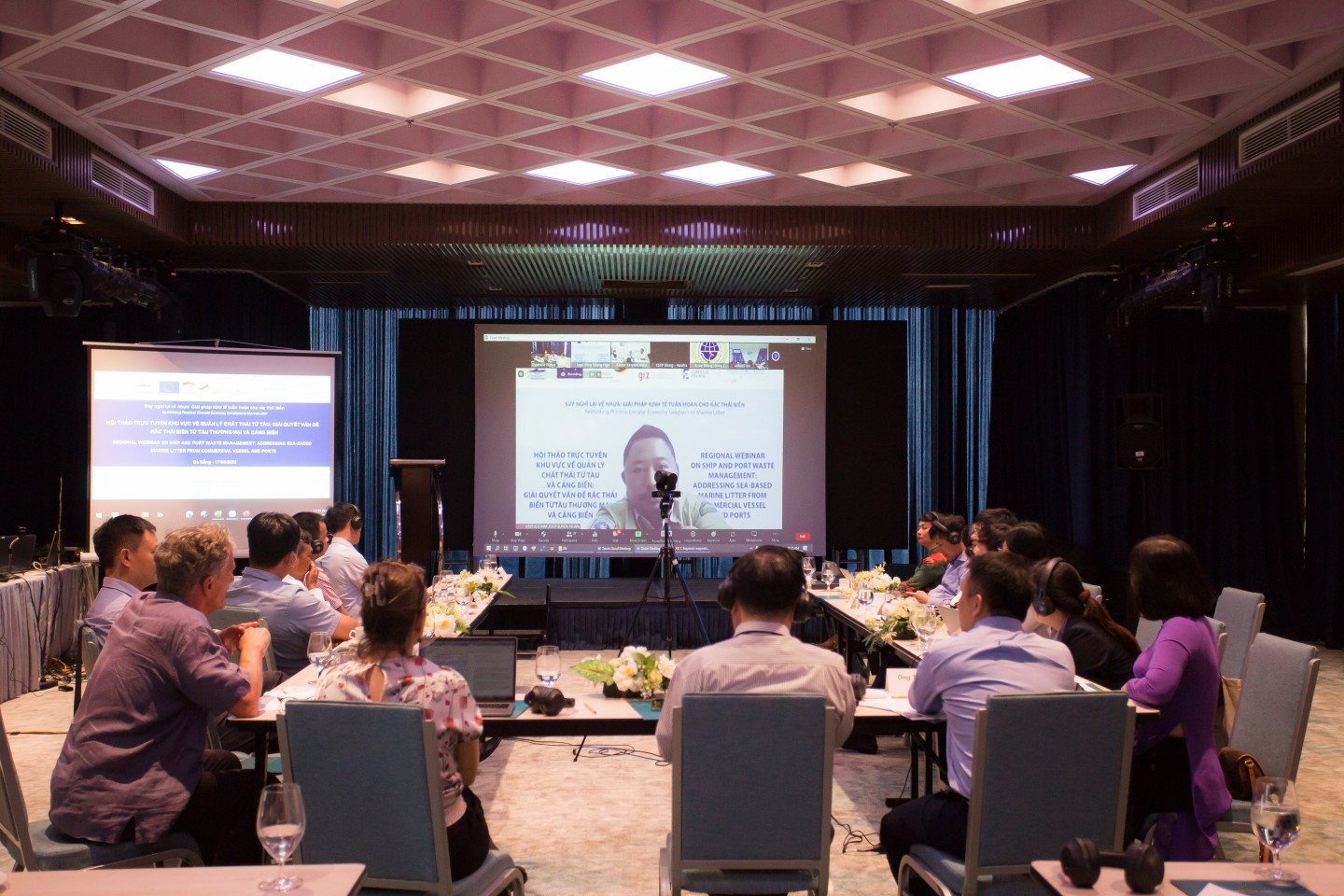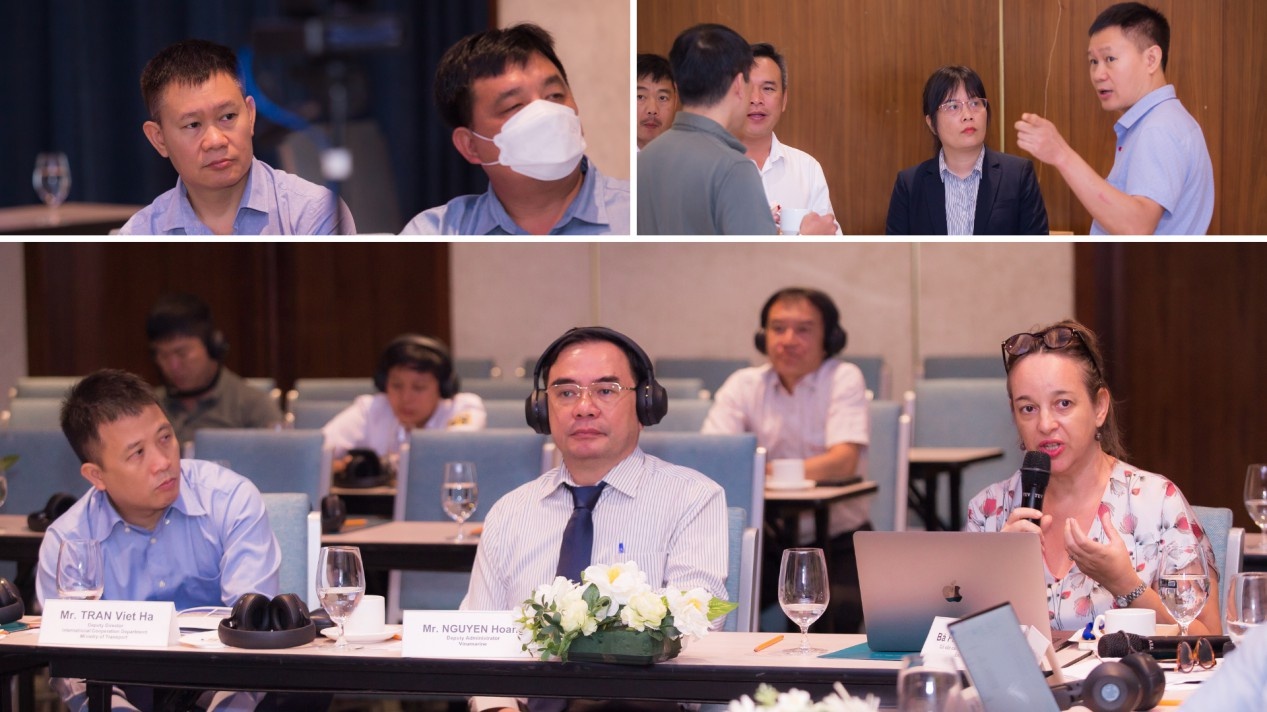Promoting regional cooperation on ship waste management
 |
The event, which took place on May 17, was part of the ‘Rethinking Plastics - Circular Economy Solutions to Marine Litter’ project, financed by the EU and the German Federal Ministry for Economic Cooperation and Development. The German development agency GIZ and Expertise France are the implementers of the project itself.
Held in a hybrid format in collaboration with Vinamarine, the workshop boasted 40 participants from the Ministry of Transport (MoT) and various ports across Vietnam, as well as more than 100 online participants from ASEAN and other regions.
It was suggested that Vinamarine and the MoT look into developing a strategy on capacity building for ship waste management in ASEAN with other countries. Tran Viet Ha, deputy director at the International Cooperation Department for the MoT said, “We need global efforts and regional cooperation, so we encourage ASEAN member states to work together.”
Vinamarine will send a new proposal via the ASEAN Secretariat, Ha added. “The proposal will then be open for comment from other member states. We look forward to closer cooperation with ASEAN, and at the same time, the MoT will support Vinamarine on this path,” he said.
It is deemed essential that vessels can deliver operational waste and cargo residues to port reception facilities in an efficient way. Such facilities need to be constantly upgraded to serve the growing number of international and domestic ships that bring cargo to ports in Southeast Asia. Whenever such facilities are absent, ships have no alternative but to dump waste, including oily items, plastic garbage, sewage, and specific hazardous waste, illegally into the sea.
This has a huge negative impact on the marine environment as well as the fishing and tourism industries, and simultaneously undermines steps taken towards sustainable port development. An improved ship waste management with clear processes and responsibilities in ports is key to tackling these challenges.
Recent changes in legislation and updated regional agreements such as in the EU have shown considerable progress in improving ship waste management by giving more responsibilities to ports, according to Anna Marczak, policy officer at the European Commission.
The effect of an EU directive on port reception facilities, issued in 2000 and revised in 2019, has been significant, Marczak explained, with the volume of waste delivered to ports increasing, while illegal dumping of waste has been reduced significantly. The introduction of indirect waste fees has contributed to this development.
“The emphasis of this directive is on reducing, reusing, recycling, and making use of a circular economy when it comes to discharged waste,” said Marczak. “There are also fee reductions for ships that have implemented greener ship management, which leads to reduced quantities of waste or smarter waste management, as detailed in the directive.”
 |
| During the conference, participating stakeholders exchanged valuable ideas for approaches to ship waste management |
In order to enforce delivery to the facilities, notification and receipt forms are used in tandem with an inspection procedure. Every EU state must have at least 15 per cent of ships inspected on this issue, following a particular methodology. A sub-group of experts also ensures that the implementation of current rules is adopted correctly.
However, Marczak noted, it could take some time for the directive to have an effect elsewhere. “If the infrastructure is not there in the ports, this directive cannot be implemented correctly,” she warned.
Based on the EU’s experiences, the introduction of indirect fees is expected to have a significant positive environmental impact in Southeast Asia, but many authorities and ports are still reluctant to introduce this approach, mainly due to competition risks.
Nevertheless, thanks to international conventions such as MARPOL (the International Convention for the Prevention of Pollution from Ships in full), waste management in ports is being better regulated today in an attempt to avoid illegal dumping. MARPOL’s Annex V seeks to eliminate and reduce the amount of garbage being discharged into the sea from ships, and applies in principle to all ships.
Cross-border agreements and regional cooperation on ship waste management have been introduced in many parts of the world and could also be relevant for the ASEAN region.
Jens-Peter Oehlenschlaeger, an expert for the Rethinking Plastics project, explained at the workshop that commitments are key to strengthening uniform measures against marine pollution.
“Ships and waste move across borders, and this is why we need regional cooperation on this matter,” he said. “Pooling resources and expertise will provide a more cost-effective way to address discharges from ships that cannot be dealt with immediately by one country. It can help authorities and ports to implement harmonised measures and ensure a more uniform implementation of such measures.”
In addition, promoting stronger ASEAN cooperation would contribute to wider global cooperation on shipping issues that are regulated under MARPOL.
Oehlenschlaeger suggested strengthening ASEAN maritime cooperation, which could include the preparation of an ASEAN Ship Waste Management Strategy, involving measures to reduce illegal discharges and utilisation of synergies as well as national and international experience.
“Uniform measures could include standard guidelines for effective ship waste management; a harmonised notification system based on a standard form between the bigger ports; the use of indirect fee principles when charging ships for discharging their waste; and a standard format for stakeholder information, perhaps in the form of a management manual,” Oehlenschlaeger noted.
Several projects around the world are already underway indicating the increasing attention to the protection of the marine environment.
GloLitter for example supports 30 countries in Asia-Pacific, Africa, and Central/South America by reducing marine plastic litter. The initiative, which is a joint effort from Norway, Australia, and Saudi Arabia, is running from 2019 to 2024, but project manager Tamara Barabadze believes it has scope to be extended.
“Legal, policy and institutional reforms are being undertaken at national levels, and capacity building is taking place regarding the enforcement of MARPOL Annex V and other legislation,” Barabadze explained.
The Rethinking Plastics programme is currently undertaking various pilot schemes in Vietnam, Thailand, Indonesia, the Philippines, and China. They include ship waste management assessments in major shipping ports, cleaner fishing ports, engaging local communities and stakeholders for better segregation and collection of plastic waste, and creating a circular economy that is also suitable for islands.
What the stars mean:
★ Poor ★ ★ Promising ★★★ Good ★★★★ Very good ★★★★★ Exceptional
Related Contents
Latest News
More News
- Trung Nam-Sideros River consortium wins bid for LNG venture (January 30, 2026 | 11:16)
- Vietnam moves towards market-based fuel management with E10 rollout (January 30, 2026 | 11:10)
- Envision Energy, REE Group partner on 128MW wind projects (January 30, 2026 | 10:58)
- Vingroup consults on carbon credits for electric vehicle charging network (January 28, 2026 | 11:04)
- Bac Ai Pumped Storage Hydropower Plant to enter peak construction phase (January 27, 2026 | 08:00)
- ASEAN could scale up sustainable aviation fuel by 2050 (January 24, 2026 | 10:19)
- 64,000 hectares of sea allocated for offshore wind surveys (January 22, 2026 | 20:23)
- EVN secures financing for Quang Trach II LNG power plant (January 17, 2026 | 15:55)
- PC1 teams up with DENZAI on regional wind projects (January 16, 2026 | 21:18)
- Innovation and ESG practices drive green transition in the digital era (January 16, 2026 | 16:51)

 Tag:
Tag:




















 Mobile Version
Mobile Version